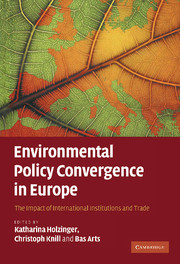Book contents
- Frontmatter
- Contents
- List of figures
- List of tables
- List of contributors
- Preface
- List of abbreviations
- 1 Introduction
- 2 State of the art – conceptualising environmental policy convergence
- 3 Theoretical framework: causal factors and convergence expectations
- 4 Research design, variables and data
- 5 Degree and direction of environmental policy convergence: analysis of aggregate data
- 6 The pair approach: what causes convergence of environmental policies?
- 7 The gap approach: what affects the direction of environmental policy convergence?
- 8 Conclusion
- Annex
- References
- Index
3 - Theoretical framework: causal factors and convergence expectations
Published online by Cambridge University Press: 22 September 2009
- Frontmatter
- Contents
- List of figures
- List of tables
- List of contributors
- Preface
- List of abbreviations
- 1 Introduction
- 2 State of the art – conceptualising environmental policy convergence
- 3 Theoretical framework: causal factors and convergence expectations
- 4 Research design, variables and data
- 5 Degree and direction of environmental policy convergence: analysis of aggregate data
- 6 The pair approach: what causes convergence of environmental policies?
- 7 The gap approach: what affects the direction of environmental policy convergence?
- 8 Conclusion
- Annex
- References
- Index
Summary
INTRODUCTION
As has been shown in the previous chapter, the study of cross‐national policy convergence is a highly popular research area in political science. Notwithstanding these far‐reaching research efforts, it is generally acknowledged that we still have a limited understanding of the causes and conditions of policy convergence.
It is the objective of this chapter to develop the theory further by a systematic discussion of the causal factors of policy convergence and by the formulation of general theoretical expectations on policy convergence for each factor. We proceed in the following steps. First, we briefly present the central aspects we distinguish for the assessment of policy convergence. In a second step, we identify and compare different causal factors of cross‐national policy convergence. Having elaborated on the major causes of policy convergence, however, we still know little about the conditions under which these factors actually lead to convergence. This is the objective of the third part of our analysis, in which we develop theoretical expectations for the different aspects of cross‐national policy convergence. These hypotheses form the background for the empirical study of environmental policy convergence in Europe presented in the following chapters. Specifications of these expectations in the form of testable hypotheses that relate to the different empirical models used in this study will be presented in the respective chapters (6 and 7).
HOW TO CONCEPTUALISE POLICY CONVERGENCE?
For the purpose of the underlying study, we define policy convergence
as any increase in the similarity between one or more characteristics of a certain policy (e.g. policy objectives, policy instruments, policy settings) across a given set of political jurisdictions (supranational institutions, states, regions, local authorities) over a given period of time. Policy convergence thus describes the end result of a process of policy change over time towards some common point, regardless of the causal processes.
(Knill 2005: 768)- Type
- Chapter
- Information
- Environmental Policy Convergence in EuropeThe Impact of International Institutions and Trade, pp. 30 - 63Publisher: Cambridge University PressPrint publication year: 2008
- 12
- Cited by

